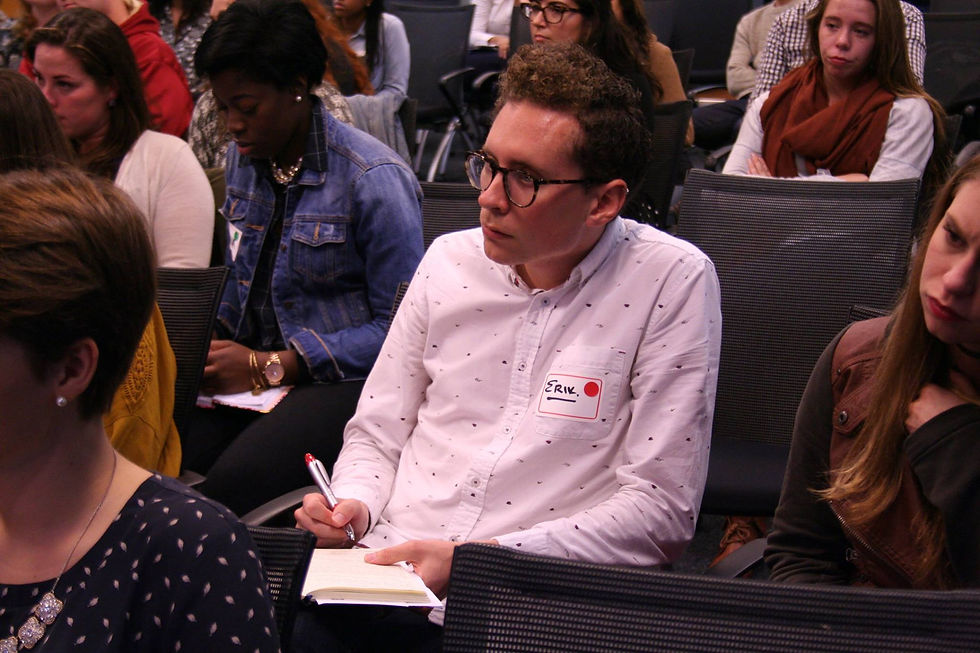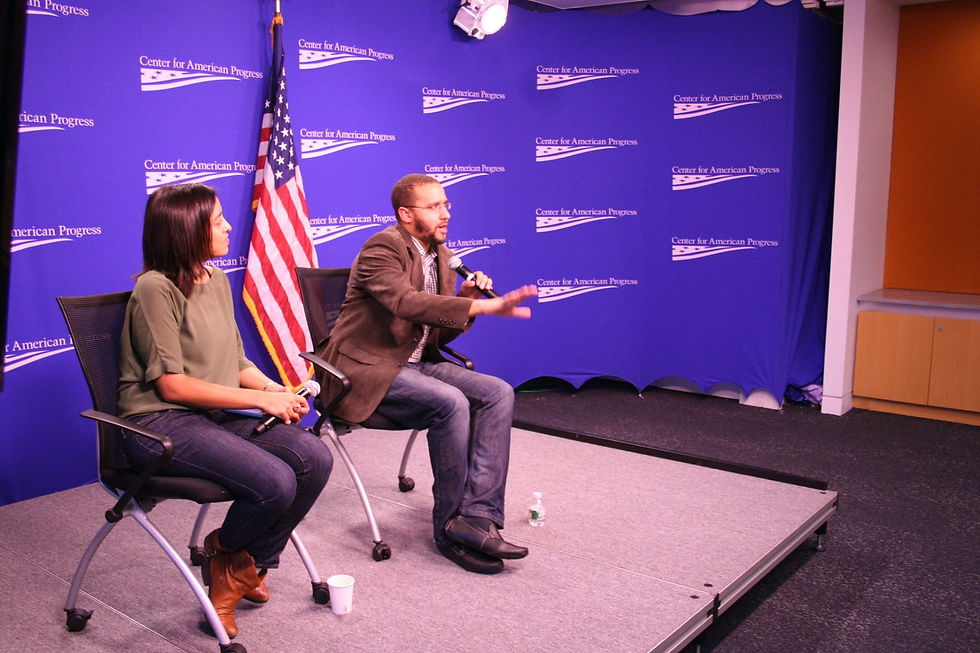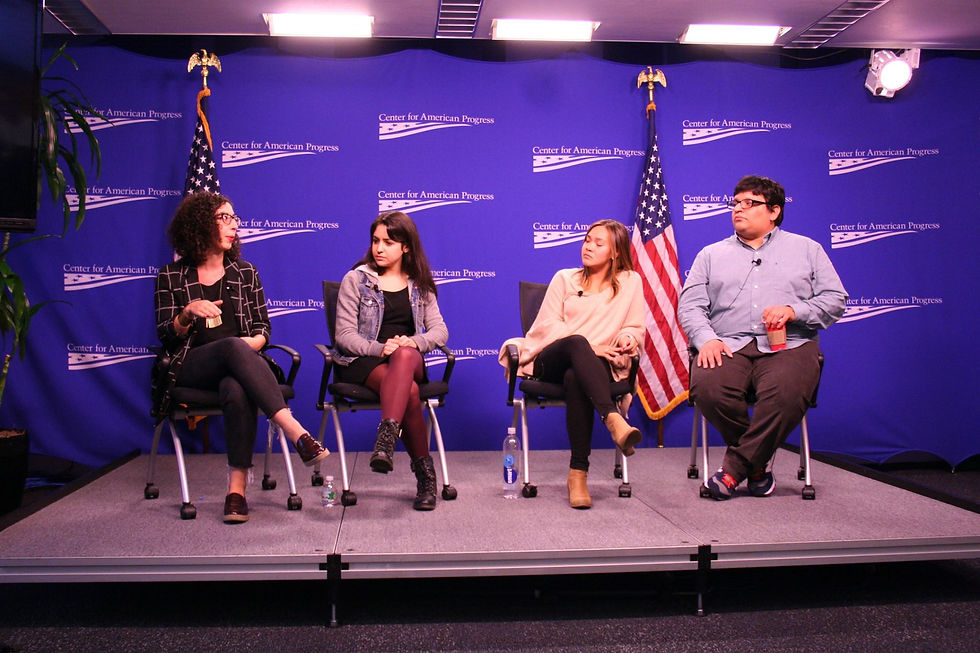Millennials Discuss Future of Journalism at Voices Network Summit
- Roy Lyle
- Dec 3, 2015
- 3 min read

Forty-two enterprising young college students from around the country gathered Saturday, Nov. 7 at the Center for American Progress in Washington DC. for the 2015 Voices Network Summit. The event was hosted by Generation Progress, a nationwide organization which engages American youth to help them promote progressive causes. The summit’s intended to allow young journalists from around the country to strengthen their journalistic skills through workshops with professionals as well as allow them to network with each other for future opportunities.
As Executive Director Anne Johnson and Communications Associate Chelsea Coatney walked up to the main stage microphone. The duo introduced themselves, as well as the staffers, and kicked off the event by explaining the purpose of the summit—to foster progressive journalistic practices amongst “Millenials,” a group defined by Johnson as “people born broadly from 1980-2000.”

After the introductory session finished, Sarah Audelo, a policy director for Generation Progress, interviewed Washington Post reporter Wesley Lowery on “Millenial Voices in the Media.” Wesley Lowery gained wide recognition in the summer of 2014 for his coverage of the protests in Ferguson, Missouri. Lowery became the subject of news himself when he filmed a police officer illegally detaining him at a McDonald’s, which had been used by journalists as a staging area due to its proximity to demonstrations.
As an older “Millenial” journalist, Lowery spoke candidly about what he saw as the future of journalism and the importance of a variety of aspects of modern day journalism—particularly how race is spoken
about in the media.
“It’s vital to have newsrooms that look like and cover the people who live in the area,” said Lowery. He reasoned that journalists need to be completely open to each other as well as to the people that they write about because “lack of shared vocabulary breaks down conversation,” after which it is impossible to construct a fair and accurately reported story.
Neville Hardman, a fourth-year attendee from Kent State University, was initially concerned that the event might be too focused on progressive politics, and not focused enough on journalism. Later, however, Hardman said that the discussion with Lowery about racial politics encouraged her to think of politics as having a real influence on journalism.
“He said a lot of things that I hadn’t really considered before his panel,” said Hardman. “Now I’m kind of thinking about how I can incorporate his message to my paper at school.”
Skyler Ashley, a third-year journalism major at Michigan State University attended the event for his school’s student publication, The Big Green. Ashley said that he didn’t immediately recognize Lowery’s name, but when they mentioned him getting arrested in a McDonald’s, Ashley stated that he “freaked out” and “knew that this guy was the real deal.”
After Lowery’s panel, the session divided into three groups covering new topics such as “managing your publication” and “telling your story.” Travis Waldron, a sports writer for The Huffington Post, hosted a session called “From Pitching to Writing” where he gave attendees advice on how to tailor their pitches to specific media outlets as well as how to make connections in specific fields and what to do with them.
He thought it was obvious, but he said one of his most important messages was that “you need to find an angle no one has found yet, because a lot of people are going to report on a story.” Waldron also emphasized the importance of being earnest and making friendly connections with sources, as in some fields they act as sources or connections to sources for multiple stories. When asked about stories that might hurt a source, Waldron did say that, “you need to know when to nuke a relationship.” He stated that a reporter has to weigh the worth of a story against a source whom they’ve likely come to know well.
Later in the day, Adam Peck

of The New Republic hosted a panel entitled “The Future of Media” alongside guests, Millie Tran of Buzzfeed, Julie Zeilinger of Mic, and Rachel Sadon of DCist. Coming from relatively new media platforms, each panelist was supportive of the idea that news media is not dead, but simply transforming. Tran especially was supportive of the idea that it was instead “flourishing.” Sadon did however comment her concerns that “because people are no longer going through the traditional format of daily papers it’s getting harder to vet incoming reporters.”
After the event ended, Hardman commented about her favorite part of event. “The workshops were so good. Some were more useful than others but all of them were really interesting. I learned a lot about being a professional journalist from the summit.”
Ashley had similar thoughts to Hardman in regards to the event surpassing his expectations. “I was kind of nervous when I saw how few people were there but it ended up being way more insightful than I expected.”
Photos Courtesy of Generation Progress




Comments